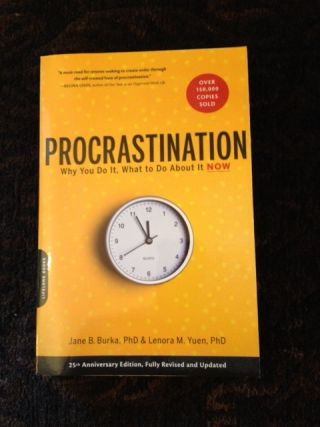Most procrastinators have a wishful thinking approach to time. Standard time management techniques encourage people to be more efficient with their time, but these techniques can’t help procrastinators who have not yet accepted that time is real, and that it ispassing.
You have to start by understanding your relationship to time.

Maybe you keep time optimistically vague:
- “I can always do it tomorrow (or next week, next month, next year).”
- “The deadline isn’t that firm.”
- “I’ll get it done soon.”
- “Once I get going, this won’t take long.”
- “When is it due?”
With this hopeful-but-indefinite attitude, time is imprecise and nebulous. There’s always more time, and anything is possible. You don’t focus on the specific details of how much time you have available, how much you can actually accomplish in a day, or how long until the deadline.
When—probably not “if”—you find yourself short on time, you may be surprised, disappointed, or even offended.
Maybe you try to control, ignore, or even deny time:
- “It doesn’t matter if I’m 15 minutes late.”
- “I can always get an extension.”
- “I don’t want anyone to micromanage my time.”
- “I live in the present moment and just chill. My spouse should stop nagging me and be chill, too.”
It can feel powerful to refuse to be controlled by the clock, the calendar, or someone else’s idea of time. Whether meeting friends for dinner or preparing for an important meeting, you make sure you do not feel subjugated by time. To avoid feeling powerless, you fight against the relentless movement of time.
When you ignore the realities of time, you may hold onto the feeling of limitless potential. When you reject the inevitability of time, you may feel independent and powerful. As long as you feel that time doesn’t matter, or somehow isn’t real, you are setting yourself up to procrastinate.
Here are 4 techniques to improve your relationship to time:
1. Recognize that our brains are wired differently.
Your sense of time starts with your biology, and everyone’s is unique. People are wired differently when it comes to their relationship to time. Scientists have discovered “clockgenes” that operate on a cellular level throughout the body, regulating daily activities likesleeping and waking. Some people are naturally morning people, and some are naturally night owls. People with ADD have trouble tracking time and find it hard to focus for long periods of time on things that don’t interest them. They can also become so focused on something interesting that they lose track of time.
Adam complains that his wife Jessica thinks he’s lazy because she gets up at 5:30 am to go the gym, and he sleeps till 7. He thinks about going to the gym after work, but the family likes to have dinner together at 6. Adam has put off starting his workout program until he can get to bed earlier and get up with Jessica.
Adam and Jessica have different biorhythms when it comes to sleeping and exercising. It might help if they could accept that they are wired differently instead of each complaining, “Why can’t you be more like me?”
2. Understand Objective Time and Subjective Time.
Objective time is clock time and calendar time, inexorable and predictable. It’s midnight, and in five minutes it will be 12:05. On your birthday, your body has lived for one more year. If you get to the theater after the play starts, you miss the beginning.
Subjective time, by contrast, is your own unique sense of time, different from anyone else’s. Sometimes you feel time passing swiftly; sometimes time crawls ever so slowly. Your definition of “late” might be 5 minutes or 30 minutes.
Brad’s wife is always mad at him for being late. “We’re supposed to leave the house at 7. Mandy is ready at 6:45, and by the time I’m ready at five past 7, she’s furious, because she’s been waiting for 20 minutes. But I’m only five minutes late!”
There is no point expecting others to share your subjective sense of time. It is yours alone. But if you accept that your subjective time may be quite different from clock time, you can make more of an effort to pay attention to clock time.
The challenge for all of us is to integrate our subjective time with the realities of clock time. Ideally, we would move easily between them.
- Can you be engrossed in an activity and still realize it’s time to leave? If you know that’s difficult for you, set a timer when you do something you know to be a time-sink, like video games or Web surfing.
- Can you recognize that a long-term project may not feel “real” yet, but start it anyway? If the future doesn’t seem real, do one small thing toward a distant but important goal.
3. Turn vague thinking into concrete thinking.
Practice telling time: Predict how long something will take and see how long it actuallytakes.
- Keep track of how long you spend working on something.
- Keep a time journal for a few days to see where your time actually goes.
- Mark you calendar with important deadlines—don’t expect to remember them, because they can easily fall into the void.
4. Accept some limits.
- Allow extra time for things to go wrong. Don’t assume everything will go smoothly once you finally make up your mind to begin.
- Small amounts of time can be useful. Use little bits of time instead of waiting for one final heroic effort.
- You don’t have time to do everything yourself. Delegate.
- Schedule work time during your prime biological time. Don’t assume you can go at full steam 24/7.

Jane Burka, Ph.D. and Lenora Yuen, Ph.D., are co-authors of Procrastination: Why You Do It; What To Do About It NOW(link is external), Da Capo Press, 2008. Updated for a 25th anniversary edition, their book has been In print since 1983. Burka and Yuen have been featured in The New York Times and People magazine, as well as on Oprah and 20/20. Burka is a psychologist and psychoanalyst in Oakland, CA, and a personal and supervising analyst at the Psychoanalytic Institute of Northern California. Yuen is in private practice in Palo Alto, CA, and is a member of the adjunct clinical faculty of the Department of Psychiatry, Stanford University School of Medicine.
